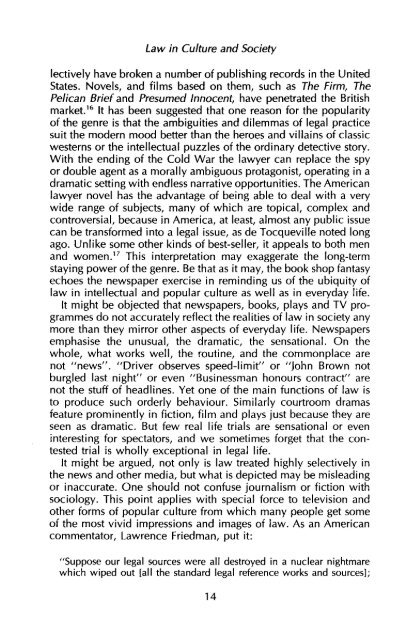Blackstone's Tower: The English Law School - College of Social ...
Blackstone's Tower: The English Law School - College of Social ...
Blackstone's Tower: The English Law School - College of Social ...
You also want an ePaper? Increase the reach of your titles
YUMPU automatically turns print PDFs into web optimized ePapers that Google loves.
<strong>Law</strong> in Culture and Society<br />
lectively have broken a number <strong>of</strong> publishing records in the United<br />
States. Novels, and films based on them, such as <strong>The</strong> Firm, <strong>The</strong><br />
Pelican Brief and Presumed Innocent, have penetrated the British<br />
market. 16 It has been suggested that one reason for the popularity<br />
<strong>of</strong> the genre is that the ambiguities and dilemmas <strong>of</strong> legal practice<br />
suit the modern mood better than the heroes and villains <strong>of</strong> classic<br />
westerns or the intellectual puzzles <strong>of</strong> the ordinary detective story.<br />
With the ending <strong>of</strong> the Cold War the lawyer can replace the spy<br />
or double agent as a morally ambiguous protagonist, operating in a<br />
dramatic setting with endless narrative opportunities. <strong>The</strong> American<br />
lawyer novel has the advantage <strong>of</strong> being able to deal with a very<br />
wide range <strong>of</strong> subjects, many <strong>of</strong> which are topical, complex and<br />
controversial, because in America, at least, almost any public issue<br />
can be transformed into a legal issue, as de Tocqueville noted long<br />
ago. Unlike some other kinds <strong>of</strong> best-seller, it appeals to both men<br />
and women. 17 This interpretation may exaggerate the long-term<br />
staying power <strong>of</strong> the genre. Be that as it may, the book shop fantasy<br />
echoes the newspaper exercise in reminding us <strong>of</strong> the ubiquity <strong>of</strong><br />
law in intellectual and popular culture as well as in everyday life.<br />
It might be objected that newspapers, books, plays and TV programmes<br />
do not accurately reflect the realities <strong>of</strong> law in society any<br />
more than they mirror other aspects <strong>of</strong> everyday life. Newspapers<br />
emphasise the unusual, the dramatic, the sensational. On the<br />
whole, what works well, the routine, and the commonplace are<br />
not "news". "Driver observes speed-limit" or "John Brown not<br />
burgled last night" or even "Businessman honours contract" are<br />
not the stuff <strong>of</strong> headlines. Yet one <strong>of</strong> the main functions <strong>of</strong> law is<br />
to produce such orderly behaviour. Similarly courtroom dramas<br />
feature prominently in fiction, film and plays just because they are<br />
seen as dramatic. But few real life trials are sensational or even<br />
interesting for spectators, and we sometimes forget that the contested<br />
trial is wholly exceptional in legal life.<br />
It might be argued, not only is law treated highly selectively in<br />
the news and other media, but what is depicted may be misleading<br />
or inaccurate. One should not confuse journalism or fiction with<br />
sociology. This point applies with special force to television and<br />
other forms <strong>of</strong> popular culture from which many people get some<br />
<strong>of</strong> the most vivid impressions and images <strong>of</strong> law. As an American<br />
commentator, <strong>Law</strong>rence Friedman, put it:<br />
"Suppose our legal sources were all destroyed in a nuclear nightmare<br />
which wiped out [all the standard legal reference works and sources];<br />
14

















